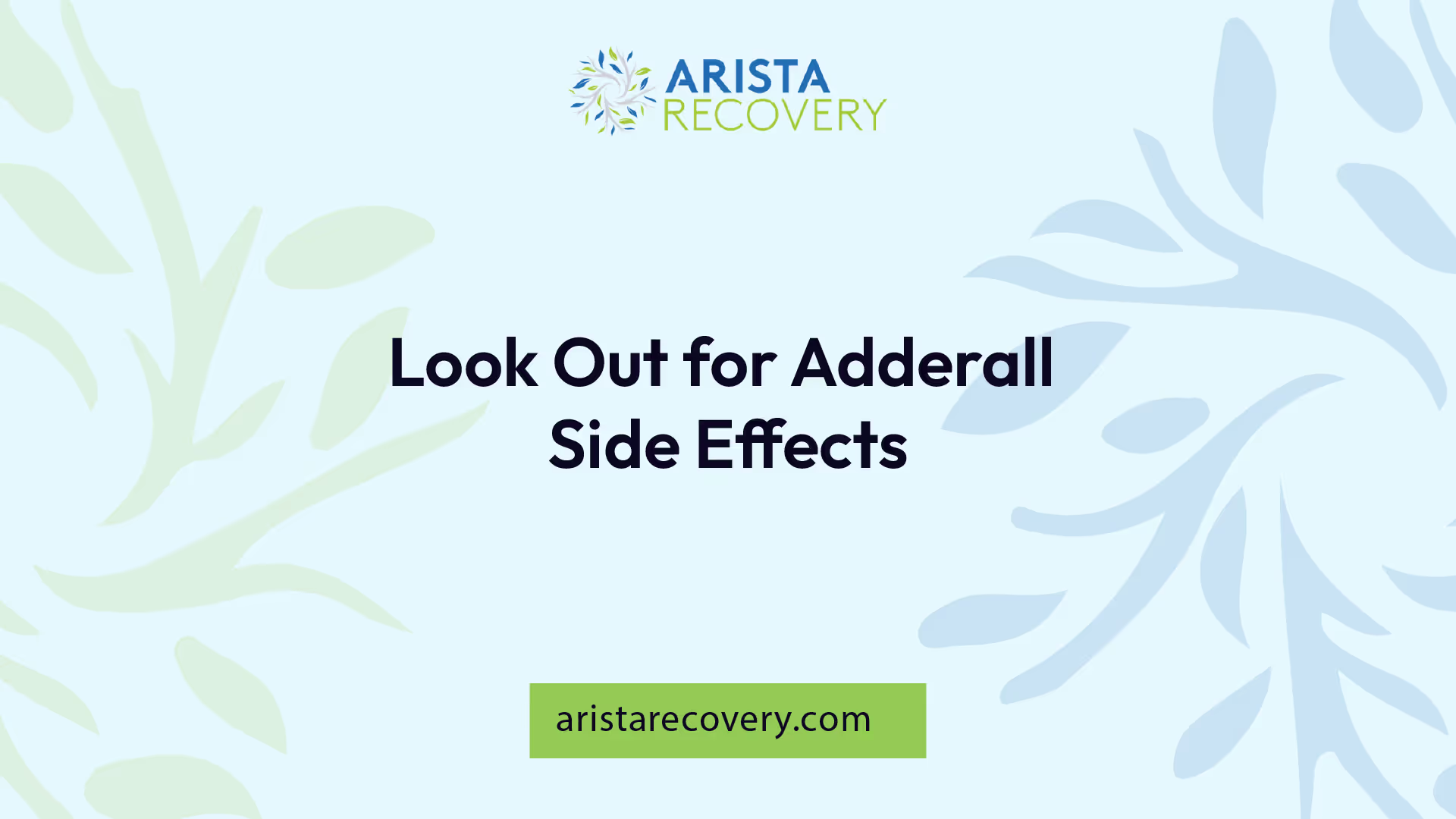Look Out for Adderall Side Effects


Understanding Adderall Side Effects
Adderall is a commonly prescribed medication used to treat Attention Deficit Hyperactivity Disorder (ADHD). While it can be effective for managing symptoms, it also comes with a range of side effects. Understanding these effects can help users make informed decisions about their treatment.
Common Side Effects of Adderall
The most frequently reported side effects of Adderall include physical and psychological reactions. These can vary from mild to severe, depending on the individual and the method of use.
Common Side EffectsDescriptionHeadacheA frequent complaint among users, especially noted in children with ADHD compared to those without.Loss of AppetiteUsers may find their appetite decreases, leading to potential weight loss.Dry MouthA common side effect that can cause discomfort.Upset StomachMay include nausea or general discomfort in the digestive system.NervousnessUsers might experience increased anxiety or feelings of nervousness.Trouble SleepingInsomnia is a reported issue, often due to the stimulant effects of the drug.DizzinessSome individuals may feel lightheaded or dizzy while using the medication.
These side effects may improve or disappear as the body adjusts to the medication [1].
Less Common Side Effects of Adderall
In addition to the common side effects, Adderall can also cause less frequently reported adverse effects. These may indicate a need for medical attention.
Less Common Side EffectsDescriptionDiarrheaSome users may experience digestive upset varying in severity.FeverThough rare, a rise in body temperature can occur.Changes in Blood PressureAdderall may lead to fluctuations in blood pressure levels.Signs of Blood Flow ProblemsThis includes symptoms like discoloration of fingers or toes.Mental/Mood/Behavior ChangesUsers may notice significant changes in mood or behavior.Uncontrolled MovementsThis can lead to involuntary tics or muscle spasms.Changes in Sexual Ability/DesireSome individuals may experience alterations in sexual function.SeizuresA serious side effect, requiring immediate medical attention.
These less common side effects highlight the importance of monitoring responses to Adderall and seeking help if severe reactions occur. Understanding both common and less common side effects is crucial for anyone considering or currently using Adderall for ADHD management.
Risks and Dangers
Understanding the potential risks and dangers associated with Adderall use is crucial for anyone considering this medication for treating attention-deficit hyperactivity disorder (ADHD) or narcolepsy. The misuse of Adderall can lead to a range of consequences, particularly withdrawal symptoms and cardiovascular risks.
Withdrawal Symptoms of Adderall
When individuals stop taking Adderall abruptly or reduce their dosage significantly, they may experience withdrawal symptoms. These symptoms can include:
Withdrawal SymptomsFatigueAnxietyDepressionPsychosis (in rare cases)Mania (in rare cases)
Individuals already diagnosed with mental health conditions may find that Adderall withdrawal exacerbates their existing issues.
Cardiovascular Risks with Adderall
Adderall can pose serious cardiovascular risks, particularly for those with pre-existing heart conditions or a family history of heart disease. Some of the significant cardiovascular reactions include:
Cardiovascular IssuesHeart attackStrokeSudden death
Reports indicate that these risks can occur even at normal therapeutic doses. Long-term misuse of Adderall may significantly increase the likelihood of fatal heart-related incidents [(Oxford Treatment Center)].
Symptoms indicating potential cardiovascular problems may include:
Immediate medical attention is necessary if any of these symptoms arise [4]. Recognizing these risks is vital for safely managing Adderall use and ensuring the well-being of those who take the medication.
Treating Adderall Misuse
Addressing Adderall misuse and its side effects requires a comprehensive approach that includes various therapeutic options and supportive activities aimed at recovery.
Therapies for Adderall Addiction
Different therapies can be beneficial for individuals facing Adderall addiction. Common therapeutic approaches include:
Additional effective strategies may include behavioral therapy, psychoeducation to understand the addiction process, and peer support groups American Addiction Centers. Engaging in exercise and mindfulness activities has shown promise in improving treatment outcomes by reducing anxiety and enhancing overall well-being [3].
Supportive Activities for Recovery
Incorporating supportive activities into the recovery process can promote healing and stability. These may include:
Activity TypeDescriptionPhysical ExerciseRegular physical activity can help reduce cravings and improve mental health.Mindfulness PracticesTechniques such as meditation or yoga can enhance focus and decrease stress levels.Peer Support GroupsParticipating in support groups fosters community and shared experiences, aiding in the recovery journey.Structured RoutineEstablishing a daily routine can provide stability and a sense of normalcy during recovery.
Choosing a combination of therapies and supportive activities can enhance recovery from Adderall misuse. Individuals recovering from addiction should work closely with healthcare professionals to create a tailored treatment plan that considers their unique needs and challenges.
Specific Populations
Understanding how Adderall affects specific populations helps in managing its use and mitigating potential side effects. Both women and children experience unique responses to this medication.
Women and Adderall Side Effects
Women and individuals assigned female at birth may process Adderall differently than their male counterparts. They can experience enhanced effects during the first 14 days of their menstrual cycle due to increased estrogen levels [1]. Factors such as hormones, body fat percentage, and gender differences can all influence the side effects experienced.
Common Side Effects in WomenDescriptionStronger CravingsWomen may experience more intense cravings for Adderall.Physical DependencyThe potential for developing a physical dependency can be higher due to hormonal influences.Serious Side EffectsWomen are at an increased risk of experiencing more serious side effects, particularly connected to hormonal fluctuations.
Adderall Side Effects in Children
Children who are prescribed Adderall may also face specific side effects. It is crucial for guardians and healthcare providers to monitor these effects closely. Common side effects in children include:
Common Side Effects in ChildrenDescriptionLoss of AppetiteParents may notice a significant decrease in their child's appetite.Weight LossSome children may experience weight loss as a result of decreased appetite.Stomach PainComplaints of stomach pain are relatively common among children taking Adderall.Sleep ProblemsInsomnia or trouble sleeping may arise as a side effect of the medication.HeadachesA review indicated that children with ADHD were more likely to experience headaches as a side effect of treatments.
Adderall can also lead to withdrawal symptoms if stopped suddenly, including severe tiredness, sleep problems, and mood changes. It is important for caregivers to be aware of these potential side effects, as they can impact a child's overall well-being and quality of life.
Long-Term Effects
Understanding the long-term effects of Adderall is crucial for anyone considering its use or currently using it. The medication can have significant implications for both cardiovascular and mental health.
Heart-related Long-Term Effects
Adderall misuse can lead to serious cardiovascular reactions, including heart attack and stroke, even at normal therapeutic doses. The risk associated with long-term use is notable, as chronic misuse may heighten the chances of fatal cardiovascular events.
Cardiovascular RiskDescriptionHeart AttackIncreased risk with misuse and long-term use.StrokePotentially elevated risk, especially among chronic users.Sudden DeathCases reported even at normal doses.
The FDA has advised that patients with serious heart problems should avoid taking Adderall. Long-term use of ADHD medications like Adderall may link to an increased risk of heart attack or stroke, although the overall risk remains small. It is also noted that Adderall may raise blood pressure and heart rate, potentially damaging parts of the cardiovascular system over time.
Long-term EffectsImpact on Cardiovascular HealthIncreased Blood PressureLong-term elevation may cause damage to the heart.Heart Rate IncreaseChronic elevation may lead to heart problems.Peripheral Arterial DiseasePossible development in those without prior issues [6].
Mental Health Effects of Adderall
Beyond physical health, long-term use of Adderall can also impact mental health. Dependence on the medication can develop, leading to misuse. Some users may experience heightened anxiety and mood swings, while others may suffer from depression as they withdraw from the medication or misuse.
Mental Health ImpactDescriptionDependenceIncreased risk of addiction and misuse.AnxietyPotentially exacerbated by long-term use.Mood SwingsFluctuating emotional states as a response to the drug.DepressionRisk of depressive symptoms, especially during withdrawal.
While Adderall is generally well tolerated and not all users will experience severe long-term effects, it is important for individuals to be aware of the potential risks involved. Monitoring mental health in conjunction with the use of Adderall is advisable for those who need to maintain optimal well-being.
Prevention and Management
Managing Adderall side effects and ensuring safe usage involves effective monitoring and addressing any severe side effects that may arise.
Monitoring Adderall Usage
It is crucial for individuals taking Adderall to adhere to the prescribed dosage and schedule as directed by a healthcare professional. Regular monitoring can aid in identifying any adverse reactions early.
Monitoring AspectDescriptionDosage TrackingKeep a record of the dosage taken daily to ensure compliance with the prescription.Symptom LogDocument any side effects experienced and communicate these to a healthcare provider.Routine Check-upsSchedule regular appointments to discuss medication effectiveness and any concerns regarding side effects.
In certain cases, Adderall can lead to a false sense of well-being, dizziness, and decreased alertness, making it important for patients to refrain from activities like driving until they fully understand how the medication affects them [4]. Monitoring these effects is essential for safety.
Addressing Severe Side Effects
Severe side effects related to Adderall usage can occur and should be treated promptly. If individuals experience significant adverse effects, it’s essential to seek medical assistance immediately.
Severe Side EffectRecommended ActionMental Health IssuesIf symptoms like psychosis or severe anxiety emerge, consult a healthcare provider for evaluation and potential adjustment of medication.Withdrawal SymptomsAbruptly stopping or significantly decreasing Adderall dosage can lead to withdrawal symptoms such as fatigue and depression. It's advised to taper off the medication under professional supervision.Serotonin SyndromeIn cases where symptoms like fast heartbeat, hallucinations, or severe nausea occur, immediate medical attention is necessary to address the potential risk of serotonin syndrome.
Long-term use of Adderall can lead to dependence or worsen pre-existing conditions, underscoring the need for ongoing support and communication with healthcare providers. By actively monitoring usage and addressing severe side effects, individuals can better manage their treatment and maintain overall health.
References
[2]:
[3]:
[4]:
[5]:
[6]:
You’re not alone in this.
When mental health challenges and addiction intersect, it can feel isolating. At Arista, we offer compassionate, evidence-based, and trauma-informed care to help you heal, grow, and move forward.
You’re not alone in this.
When mental health challenges and addiction intersect, it can feel isolating. At Arista, we offer compassionate, evidence-based, and trauma-informed care to help you heal, grow, and move forward.
Support that moves with you.
You’ve taken a brave first step. At Arista Recovery, we’re here to help you continue with best-in-class care designed for long-term healing and support.
.webp)






